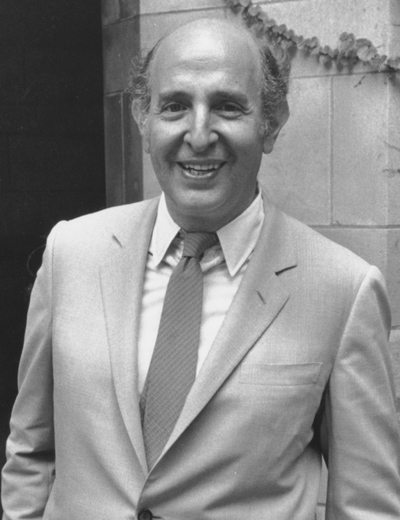
Introduction
A leading student of the political philosopher Leo Strauss, Allan Bloom held professorships and other teaching positions at Yale, Cornell, the University of Toronto, the University of Chicago, Tel Aviv University, and the Ecole Normale Supérieure. Bloom’s literal yet engaging translations of Plato’s Republic and Rousseau’s Emile first brought him to prominence; they are widely recognized as the best English editions of those classic works, and they served as models for other translations of the works of Plato and Aristotle. His critique of elite universities and the education of the gifted young, The Closing of the American Mind, became a national best seller in 1987, and brought Bloom wide public recognition.
Bloom’s scholarship covered many topics in the history of political philosophy and in literature. His discussions often combined rigorous interpretations of classic texts with incisive commentary on contemporary issues in politics, education, and culture. The power, charm, and intelligence of his teaching attracted many gifted students to him, many of whom went on to distinguished careers in academia and government.
The Closing of the American Mind
The Closing of the American Mind, published in 1987, is one of only a small number of Bloom’s writings in which a contemporary issue is explicitly addressed. However, even this best seller is grounded in a deep engagement with classical philosophy and literature. Bloom’s central contention in Closing is that the universities’ appropriation, popularization, and Americanization of German philosophical doctrines (derived from Nietzsche and Heidegger) have contributed, perhaps paradoxically, to students’ ever more resembling the flat-souled, spiritless “last man” whom Nietzsche criticized. Bloom’s critique of a culture characterized by an unreflective moral relativism, the diminution of serious pursuits, the abandonment of the philosophic quest, a vulgarizing of art and music, and a coarsening of love and friendship, is above all a call for a renewed study of the essential works of philosophy and political philosophy (including those of Nietzsche and Heidegger), and the eternal questions they pose. The book’s concerns struck a popular chord, resonating with worries about the contemporary state of American higher education.
Read More: The Closing of the American Mind, Education, Relativism, Nietzsche
Plato
Bloom said that his education “began with Freud and ended with Plato.” He maintained that Plato’s work constituted an essential element of any philosophic reflection and thus also remained relevant for contemporary studies. Bloom’s translation of Plato’s Republic stands out as one of the most important scholarly achievements of the twentieth century. Bloom’s immense feel for Plato and the accuracy of his translation allows readers who do not know Greek the opportunity to wrestle directly, as far as possible in translation, with Plato’s enigmatic work. In addition to this acclaimed translation, Bloom commented on shorter Platonic dialogues such as the Ion and the Hipparchus. Each of his translations and interpretations sought to bring forward and be guided by the precise meaning of Plato’s language while avoiding terms and analyses colored by medieval scholasticism or modern liberalism, or by the attempt to create “relevance” through the introduction of non-Platonic, colloquial terms and examples.
Bloom wrote extensively on the Republic and the Symposium. His interpretation of the Republic (which follows his translation in the same volume) seeks to attend step by step to Plato’s text, and examines perplexities in the work, such as internal contradictions in the dialogue and misquotations of Homer, that help lead us to a deeper understanding. His procedure follows the practices of his teacher Leo Strauss. Bloom’s interpretation is especially attentive to Plato’s understanding of the philosophic life itself, its possibilities and difficulties, and its connections to and differences from political life. He was especially alert to the place and importance of philosophic longing and eros, a concern that also marks his interpretation of Plato’s remarkable dialogue on love, the Symposium. This dialogue, which features Socrates, Aristophanes, the tragic poet Agathon, and the political figure Alcibiades among others, called forth Bloom’s acute understanding of poetry, love, education and the human soul generally. It forms a chapter in Bloom’s Love and Friendship, and is also published together with Seth Benardete’s striking interpretation and translation of the dialogue.
Read More: Plato, Socrates, Philosophy and the City
Rousseau
Bloom wrote on several works of Rousseau in addition to the Emile, translating and commenting on Rousseau’s Letter to D’Alembert on the Theater, and discussing Rousseau generally in a chapter in Strauss and Cropsey’s History of Political Philosophy. Bloom understood Rousseau as a theorist of both the “general will” and the “solitary walker,” a critic of the selfishness fostered by the doctrines of modern liberalism. Rousseau’s attempt to revive ancient virtues, Bloom argued, rested on an “historicist” understanding of human nature which appeared to foreshadow postmodernism and relativism. However, beneath these apparent contradictions, Bloom argued, lay Rousseau’s desire to restore the unity of man and the classical dignity of politics. In Rousseau, as in Plato, Bloom found an awareness of the highest human longings, aspirations dependent upon, yet often in conflict with, political life. Rousseau’s Emile is a book, wrote Bloom, “comparable to Plato’s Republic, which it is meant to rival or supersede….The wholeness, unity, or singleness of man—a project ironically outlined in the Republic—is the serious intention of Emile and almost all that came afterward.”
Read More: Rousseau, Hobbes, Locke
Shakespeare and Literature
Bloom’s book Shakespeare’s Politics, co-authored with Harry Jaffa, represented a pioneering study of the political and philosophical implications of Shakespeare’s works. Bloom devotes particular attention to Shakespeare’s portrayal of ancient, pagan subjects in contrast to Christian societies as well as to the challenges to religious order brought about by an emerging commercial modernity. Bloom also explores Shakespeare’s understanding of love, both in this book, in which he examines the Merchant of Venice, Othello, and Julius Caesar, and in Love and Friendship, in which he offers interpretations of other works by Shakespeare, such as Romeo and Juliet.
Read More: Shakespeare, Jonathan Swift, Ancient vs. Modern
Also see the Great Thinkers website covering Shakespeare and Politics.
